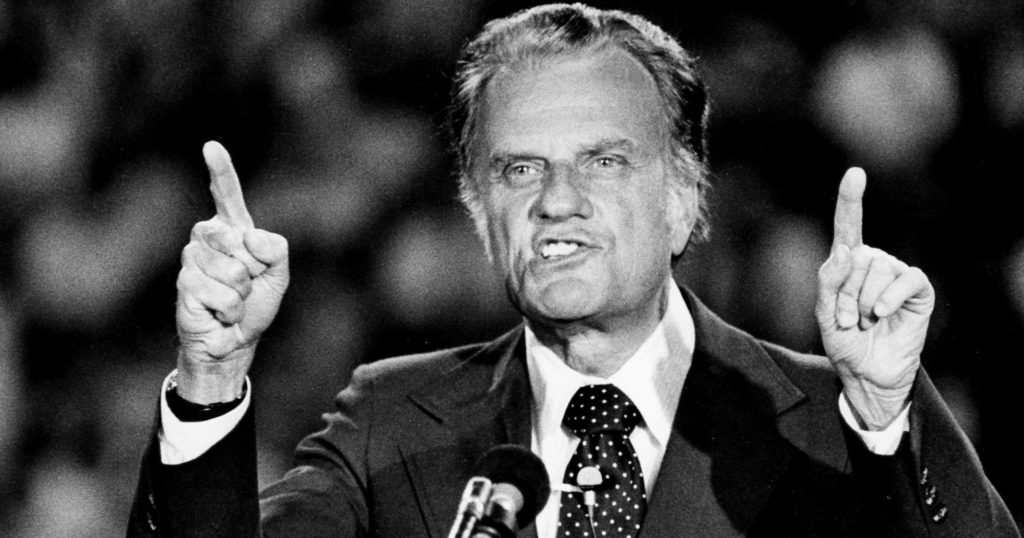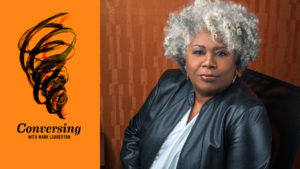Billy Graham’s death on the same day as the anniversary of the assassination of Malcolm X is an interesting postscript to the life of America’s premier evangelist of Americanism. It would take an outsider to deftly articulate Graham’s mission. In his speech, Message to the Grassroots, Malcolm X said: “I have watched how Billy Graham comes into a city, spreading what he calls the gospel of Christ, which is only white nationalism. That’s what he is. Billy Graham is a white nationalist; I’m a black nationalist….”
I’m sure that Billy Graham did not like being called a white nationalist back then, and many evangelicals will bristle at this quote even now. With Graham’s death, it’s time to reconsider how his promotion of a nationalistic version of Americanized Christianity has influenced evangelicals today. Graham’s proximity to the office of the presidency and government since the Eisenhower administration is part of why we see scenes of eager evangelicals embracing President Trump. It’s also responsible for a large cohort of evangelicals who are actively supporting Islamophobia, isolationism, and America first policies.
Billy Graham may have been “puffed up” by William Randolph Hearst newspaper reporters in his first crusade in Los Angeles, but the more important event in Graham’s ministry was his Washington, D.C. crusade in 1952. It was there that he would begin what was part of his lifelong work: fusing Christianity and Americanism together to create a potent cocktail of Evangelical Christian Nationalism. Graham was allowed to lead an Evangelistic Service from The Capital Steps and Plaza on February 3 1952. Graham’s permission to preach from the capital at the time had to be given by three different governmental officials: Vice President Barkley, Speaker of the House Rayburn, and David Lynn, Capital Architect. That service was reported in the AP newswire as follows:
Evangelist Billy Graham Reports “Hunger For God in Washington” (AP)~Evangelist Billy Graham told a crowd from the steps of the United States Capitol yesterday: “If I would run for President of the United States today, on a platform of calling the people back to God, back to Christ, back to the Bible, I’d be elected. ‘”There is a hunger for God today.” The 33-year-old, blonde, wavy haired preacher gave two sermons during the course of an hour-long meeting carried coast-to-coast by a radio network. In one sermon he asked the U. S. Senate and House to call upon President Truman to set aside a day of prayer—as did President Abraham Lincoln on April 13, 1863—as a “day of confession of sin, humiliation, repentence, and turning to God at this hour.” Graham spoke from the place where the stand is erected for the inauguration of presidents. Mr. Truman, specially invited, did not attend. The crowd filled about half of the paved parking space facing the center steps of the Capitol. The staircases leading up to the House and Senate wings of the Capitol were liberally dotted with people.
This event would lead to a national day of Prayer for the nation to be established, which is now celebrated every February with a prayer breakfast, starting in the Eisenhower administration. Graham’s friendship with Eisenhower would be the beginning of his relationships with many presidents, and presidential candidates. Graham could thus, at once, be the perfect Southern folk preacher from North Carolina and have access to the halls of power. His particular brand of fiery preaching with a gentle call to Jesus might have been reminiscent of Billy Sunday, but it was every bit made for the modern era of television and visual culture. Standing like a blonde icon of white male American power, his good looks and message would carry him all over the world as a representative of American power and the nation’s Christian faith.
Graham’s preaching and evangelistic crusades are what many will remember him for, but Graham’s unique position as an exceptional articulator of American political power is equally a part of his legacy. This was on display whenever a president needed him to provide the imprimatur of Christianity for an American activity, policy or action. Richard Nixon would use Graham in this way by having him open the “Honor America Day” events on July 4, 1970, which Nixon envisioned as a way to bring the country together after the Kent State massacre and the toll of the Vietnam War. Graham led a prayer service on the steps of the Lincoln Memorial. Graham’s sermon included checking the “stitches” (on the US flag) of racism, poverty and foreign policy. While Graham and others promoted a strong America, part of the audience engaged in an “Honor America Day Smoke-In,” while white nationalists protested for the white man.
While Graham would later begin to reconsider his relationship with power, his impact on American Christianity and politics is indisputable. Graham has paved the way for evangelicals to operate not only comfortably in the political world, but as lobbyists for theocratic policies and moral issues. Today, evangelicals find themselves on a regular basis in the Trump White House, laying hands on the President, staying at Trump Hotels, and acting as a de-facto approval committee for the Trump administration, no matter how antithetical to the gospel.
This proximity to power which Graham achieved as the representative of Christian America is unparalleled. That is without dispute. What is up for conversation, is how that representation has culminated in evangelical leadership backing the president with the lowest approval rating in American history, while posing for pictures with him in the oval office. We have Billy Graham to thank for that dubious distinction, and it’s worth looking back in the wake of his passing to see how his form of folksy American pious politics morphed into a power grab by evangelicals to establish their particular brand of theocracy in America. President Trump fully embraces the isolationist, hegemonic WASP politics that son Franklin Graham and many others promote today. The apple doesn’t fall far from the tree. Franklin Graham simply represents a more strident version of 1950s Billy Graham.
It’s not surprising then, that Billy Graham will finish his race in the United States Capitol next week. House Speaker Paul Ryan has indicated that Billy Graham will lie in state in the Capitol from February 28 to March 1st. For the most prolific modern-day evangelist of not only Jesus, but a nationalistic American style of Christianity, this is the right ending to a complicated story. Billy Graham is finally at rest, but we still wrestle with his complicated legacy.



